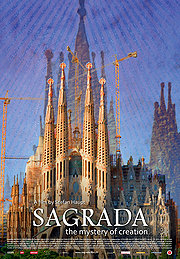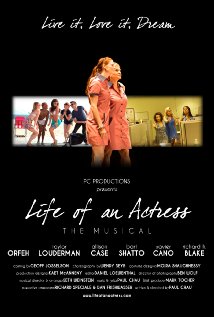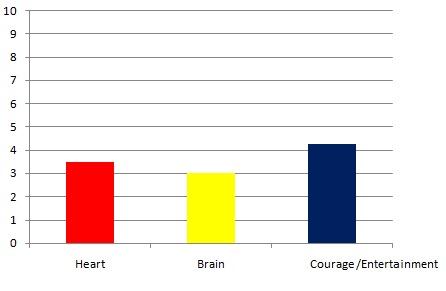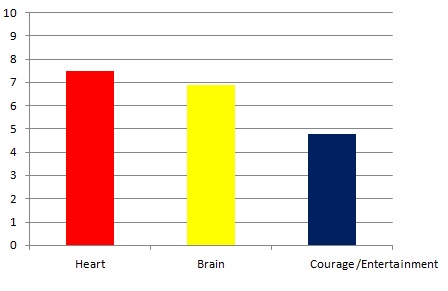
Main Page
Alphabetical Menu
Chronological Menu

In 1883, Antoni Gaudi was commissioned to design La Sagrada Familia, a church in Barcelona, Spain. He died in 1926 before the church could be completed. Now, over 125 years after it had started to be built, La Sagrada Familia is in the process of continuing to be constructed. Sagrada: The Mystery of Creation focuses on the new attempt to finish constructing the church, a task with many complications and critics who oppose the fact that its new architects aren't adhering to Gaudi's vision. Director Stefan Haupt provides you with a reader's digest version of what's going on with La Sagrada Familia in modern times, but he barely scratches the surface where the tensions between the critics and architects could be further explored. More interviews with its critics could have shed more light and provided more of a balance to all the perspectives, i.e those of Etsuro Sotoo, a Japanese sculptor who converted to Catholicism to be closer to Gaudi while building the church. He explains in detail the relationship between him and the inanimate objects that "permit" him to sculpt them. While bits of info are interesting, they don't really go to the heart or meat of the issue behind Sagrada. Haupt raises too few challenging questions, i.e. what would be built by Catholics today if churches were no longer being built?, but he doesn't bother to have them answered, thereby leaving you wishing for more insight/analysis, a crucial part of practically all documentaries. Sagrada opens via First Run Features at Elinor Bunin Munroe Film Center. Life of an Actress: The Musical  Three aspiring actresses, Hannah (Orfeh),
Sandy (Allison Case), and Jen (Taylor Louderman), work at a New York diner while struggling to make
their dreams of acting come true. The diner's owner, Charlie (Bart Shatto), has a tough time paying
the rent and dealing with a greedy developer, Bradley (Richard H. Blake), who wants to buy the diner
to build condominiums there instead. Life of an Actress: The Musical has very little in terms of charm, insight or even entertainment value. The clunky, stilted screenplay by writer/director Paul Chau says virtually nothing new or surprising about the world of acting which would have been forgivable if it were just frothy, amusing, perhaps even campy fun. Instead, it goes back and forth between contrived, shallow dramatic scenes and silly, awkward musical numbers that don't generate any sentiments other than making you cringe. The songs sound like they were pre-recorded on a sound stage while the actors lip-sync to it without much conviction or pizzazz for that matter. Each actor and actress deserves much better material, but at the same time they fail to rise above it. Its rushed, unrealistic third act reflects the film's laziness with unearned resolutions. Life of an Actress would have been just awkward in a harmless way if it weren't for its 2 hour running time that turns it all into a bloated, tedious and exhausting mess.  Winter Sleep  Aydin (Haluk Bilginer), a former actor, runs Hotel Othello, a small hotel located in the region of Cappadocia, Turkey. A young boy, Ilyas (Emirhan Doruktutan), who lives at the hotel with his father, Ismail (Nejat Isler), throws a rock at Aydin's car, thereby setting a series of events that gradually show Aydin's true nature as a self-centered, controlling and arrogant man--a classic example of a narcissist. Aydin lives with his much younger wife, Nihal (Melisa Sözen), and his divorced sister, Necla (Demet Akbag). Based on short stories by Chekhov, the screenplay by Nuri Bilge Ceylan and Ebru Ceylan centers on a lot of lengthy discussions between Aydin and other character that make his seem more and more like a monster. He gloats about himself, can't handle criticism from his sister about his writing, and seems to have many different personalities or performances that he uses to mask his ugly true self. If that sounds like it could be an interesting character study, you're right. Winter Sleep certainly has that possibility, but it doesn't let it rise to its full potential because with there's not enough left for the audience to interpret. Despite how often the characters converse with one another, you don't get a sense of much-needed nuance or subtlety that would have made these characters (and the film itself) much more engaging as it progressed. Director/co-writer Nuri Bilge Ceylan does include some lyrical symbolisms, such as the blankets of snow that keeps the ground hidden beneath it (much like Aydin hides his true, ugly self), or "Othello", the name of the hotel, which, again, describes Aydin's character in many ways. Those symbolisms, though, are overshadowed by the many lengthy, exhausting, albeit thought-provoking conversations throughout the overlong running time of 3 hours and 16 minutes. However, as the saying goes, less is more, and, after a while, talk is cheap. The performances, while decent, don't help to compensate for the lack of subtleties and complexities within the screenplay. At least Ceylan does what very few directors do nowadays: he trusts your patience as an audience member. He might even trust that patience too much because by the 2-hour mark, you mostly likely will find that Winter Sleep has started to overstay its welcome.
 Main Page Alphabetical Menu Chronological Menu ______________________________________________________ |
The NYC Movie Guru
themovieguru101@yahoo.com
Privacy Policy